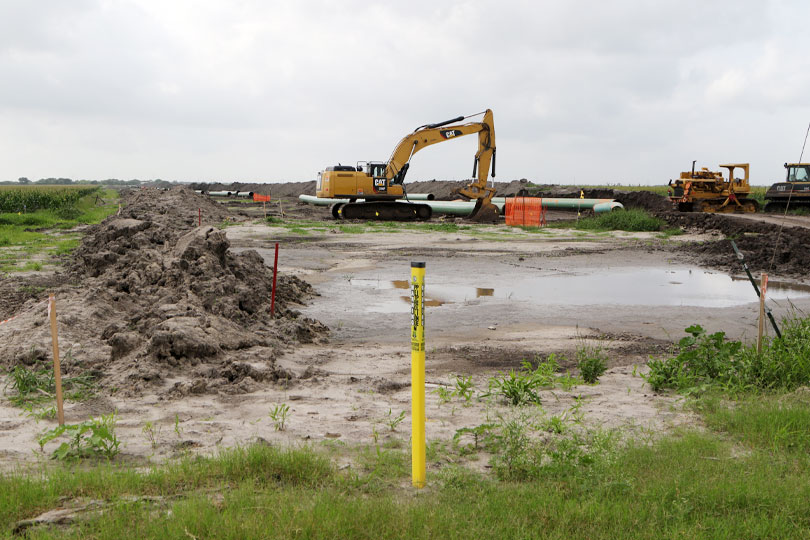Texas landowners deserve fairness and transparency when their property is taken with eminent domain authority.
A bill filed by Rep. DeWayne Burns, HB 901, aims to reform the state’s eminent domain process. It picks up where negotiations left off during the 86th Texas Legislature in 2019.
This bill has been set for a hearing in the Texas House Committee on Land & Resource Management at 8 a.m. on Tuesday, March 30.
HB 2730 by Rep. Joe Deshotel will also be heard. This legislation was written by the condemning entities and would not improve the eminent domain process for landowners. Texas Farm Bureau opposes HB 2730.
Texas Farm Bureau urges landowners and county Farm Bureau leaders to support HB 901 either by attending the hearing and testifying or submitting comments online.
Click here to submit comments.
Comments submitted electronically will become part of the official record on these bills.
About HB 901:
HB 901 proposes amendments to the Texas eminent domain process. It includes the language agreed to by Texas Farm Bureau in 2019 to ensure landowners get a fair bona fide offer and required easement terms with the initial offer.
Under HB 901, a private entity with eminent domain authority has made a bona fide offer only if the initial offer includes:
- The complete written report of the property’s value and the private entity’s basis for initial offer; including any damages to the remaining property.
- The value or estimate price must be determined by one of the
- following prepared by an appraiser or real estate broker:
- property appraisal,
- comparative market analysis,
- broker price opinion, or
- market study.
- The value or estimate price must be determined by one of the
- The Landowner Bill of Rights; and
- A conveyance document with the required minimum easement terms.
Minimum Easement Terms:
- Required terms for pipeline and transmission line easements;7
- The required terms are negotiable after the initial offer;
- Easement document must be filed with condemnation petition.
The Special Commissioners’ hearing also stands to gain procedural efficiency. If HB 901 is passed, the condemnation court judge will appoint two alternate special commissioners if one of the three special commissioners is struck by each party. The alternate special commissioner would then serve as a replacement for the stricken commissioner. This “pre-appointment” contributes to procedural efficiency for everyone involved. Rather than waiting for the new appointment after a strike, the process is predetermined before the proceeding begins. This simply reorganizes the process for judges. They will already be searching for special commissioners and can select all five at once, rather than breaking it up into multiple searches.
Texas Farm Bureau’s Position:
HB 901 includes the agreements the industry made with the landowner groups in 2019, and it only applies to private companies. HB 901 includes the agreements made on bona fide offer and required easement terms.
TFB agreed to leave landowner meetings out of HB 901, because the industry would not agree to a meeting that would provide landowners with the information they need in a timely manner. In lieu of requiring the condemning entities to conduct meetings, TFB initiated a program to conduct landowner meetings, and it sponsored a landowner’s guide to the eminent domain process with Texas A&M AgriLife Extension.


With the flood of new people from other states, the real threat is taking private property for public parks and trails.
Currently there is a group from Cali, working with local groups to do just that.
I do not agree or believe in eminent domain laws. Those who invoke such are claiming their rights are greater than the owners. That’s BS!
I am strongly in favor of HB 901 . I am strongly opposed to HB 273 .
Neither of the bills goes far enough to protect the landowners. Many of the properties that may face eminent domain have been tax paying properties in the same family for over 100 to 150 years. In many cases the 5th or 6th generation operating the property. The one time payment of “fair market value” as determined by a third party is never enough. Most entities granted eminent domain rights will continue to reap income from the project for years. It is only just that the landowner share in those incomes and not just one payment, especially when the property is designated a heritage property or eligible to be so designated.
We have 4 eminent domain pipelines that run the entire width of 3 properties. Two of these lines were installed over 30 years ago. Two others were installed in the last 5 years. Damage from the 30+ years lines is still visible. The last 2 pipelines had excessive damage during construction. We had to sue the pipeline for breach of contract. It took 3 years to settle the issue and these condemning entities have all the power. For-profit companies take advantage of the eminent domain process. They continue to make money for years while only paying minimal amounts for the use of the land for, literally, eternity. Rep. Burns has been a champion for property owners. Please support Rep Burns’ bill HB901
I strongly support House Bill 901 and oppose house bill 2730. Land owners deserve more rights. Owning and managing land is a private property right.
I support House Bill 901 and oppose house bill 2730. Owning and managing land is a private property right.